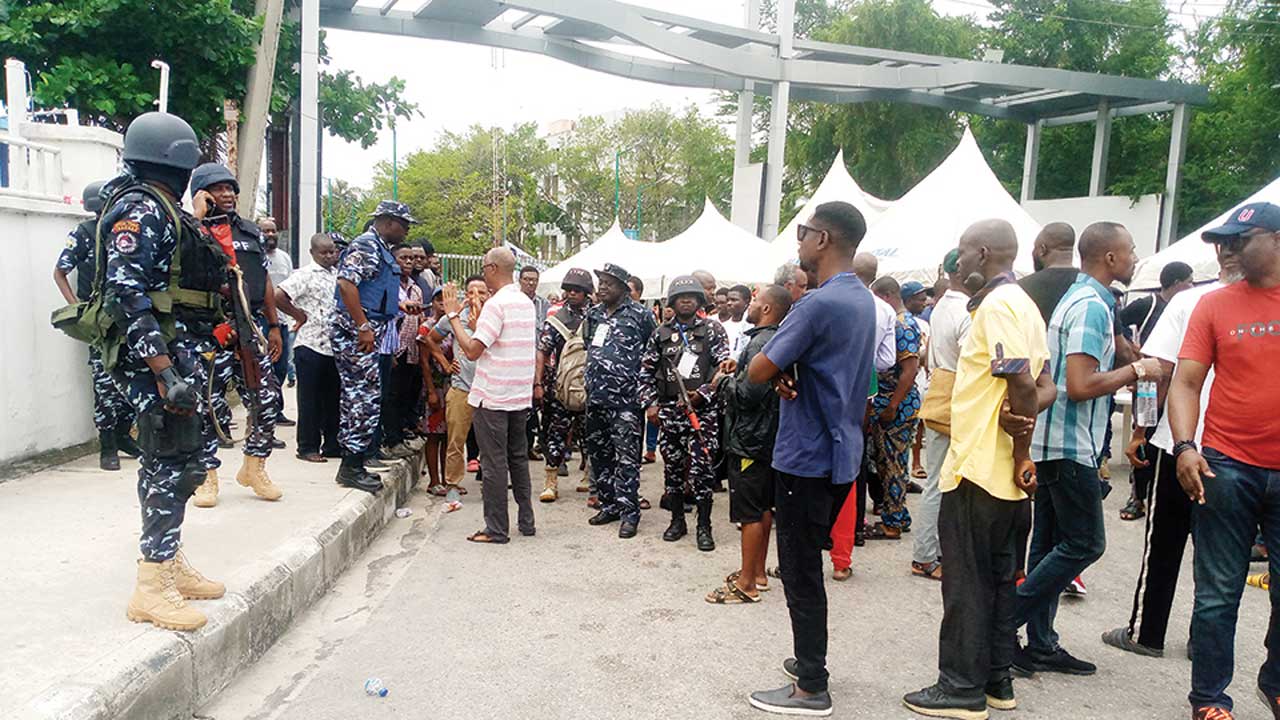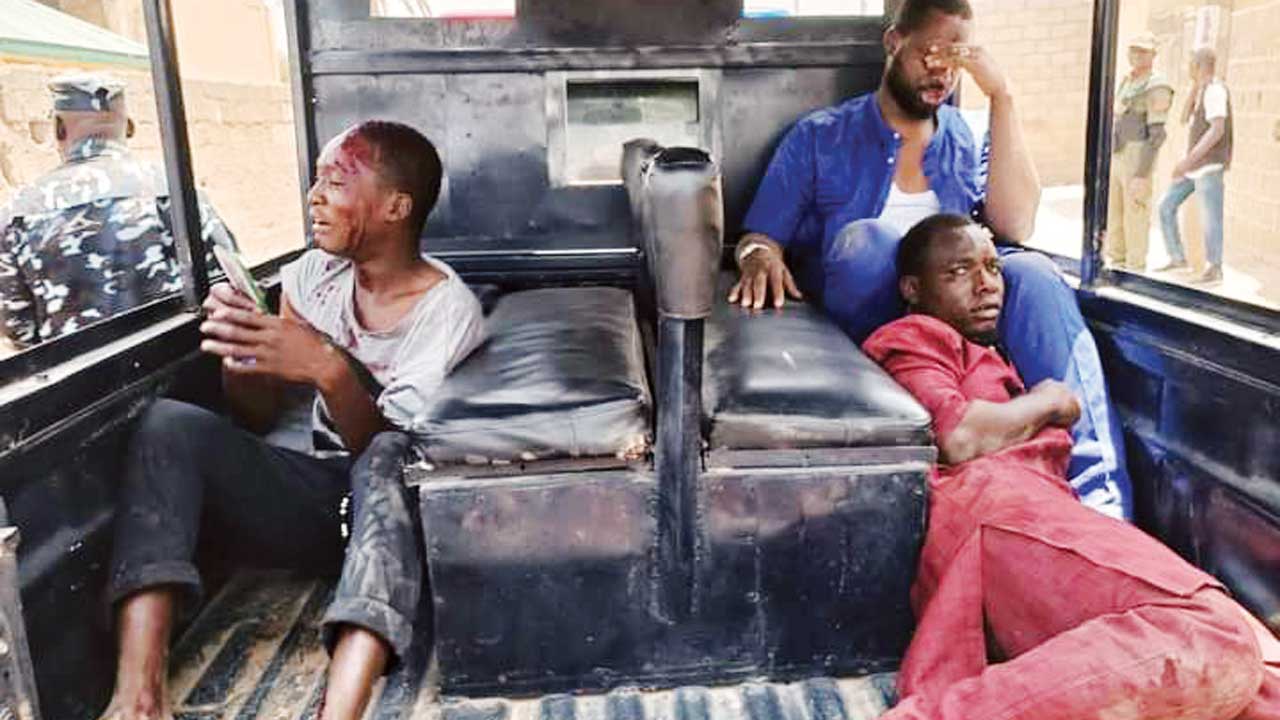
• CHRICED: 2023 polls reveal Nigeria’s declining democracy
• You should explain to Nigerians why BVAS developed many faults, CSOs tell INEC
• Those giving ethnic, religious colouration to Obidient movement parochial, says Obi
The Federal Government has been tasked to arrest and probe perpetrators of various acts of electoral violence during the just concluded general elections before it’s too late. This is after the National Human Rights Commission (NHRC), yesterday, disclosed that it received 450 complaints of human rights abuses and violations during the polls.
According to the Commission’s Executive Secretary, Tony Ojukwu (SAN), while 300 complaints of human rights violations were received during the Presidential and National Assembly elections, 150 cases were recorded during the governorship and state Houses of Assembly polls.
Ojukwu stated these in an interview with journalists in Abuja, during the launch of the e-rights project by the Avocats Sans Frontières France, popularly known as Lawyers Without Borders.
The project, which was funded by the European Union (EU), is aimed at promoting the rights of Nigerians in the digital sphere, harnessing opportunities and addressing challenges provided by new technologies.
Recall that over 700 offenders were arrested by men of the Nigeria Police Force (NPF) for violation of electoral laws during the elections. Disclosing this on Tuesday, Inspector General of Police, Usman Alkali Baba, said the exact figure of those arrested currently stands at 781.
Giving more details regarding the arrest, IGP Baba said 185 cases of electoral infractions were recorded during the presidential election with 203 arrests made. For the governorship and State Assembly elections, the police chief stated that 304 electoral breaches were recorded with 578 offenders arrested.
The NHRC boss stated that the Commission closely monitored activities of law enforcement and security agencies during the elections.
He said: “Of the 450 complaints received, I cannot say exactly the categorisation. This is because some were about violence, vote buying, voter suppression, intimidation and hate speech. Don’t forget, we had a situation room, which was able to harness the complaints of Nigerians across board of the violations that happened during the elections.
The Vice President of ASF France, Ivan Paneff, said the agency had over the last 15 years, worked with Nigerian institutions to protect human rights of citizens.
He, however, said the coming of modern technologies have made it necessary to look at the aspect of digital rights.
“Now, we have entered a new phase in a new area of the law due to the permanent intervention of electronic devices, tools and networks in our day to day life. It means we have to take that in account to protect the rights of citizens and fight against abuses, using tools, networks and different bad behaviours of certain bodies or companies.”
On her part, Country Representative of ASF France in Nigeria, Angela Uwandu, warned against censorship of online platforms, saying freedom of expression have to be guaranteed, not just offline, but also on online platforms.
According to her, the e-project will respond directly to the needs of youths, activists, journalists, bloggers, social media influencers, human rights defenders and active citizens to have access to a free and open internet.
THE Resource Centre for Human Rights & Civic Education (CHRICED) has asked the Federal Government to arrest and probe those who perpetrated various acts of electoral violence during the polls.
The group warned that should authorities fail to take action against perpetrators of all the criminal acts, which were committed on the election days, citizens would take action in the form of sending petitions to national and international bodies, especially where perpetrators of such acts have been properly identified.
CHRICED’s Executive Director, Ibrahim Zikirullahi, said: “Given the climate of fear, anxiety and uncertainty, which now pervades our country, there can be no mistaken the fact that all is not well. From the discontent in the polity, to the worries posed by an economy in tatters, Nigerians are having it rough in the hands of the current ruling elite.
“CHRICED believes strongly that it is not yet too late to investigate, apprehend and prosecute the brigands and their backers for the crime of violently subverting the vote of the Nigerian people.
“Sadly, as we speak, the gang of criminals and thugs who assaulted and threatened electors on Election Day are still walking scot-free,” he said.
The group further noted that the 2023 elections, which witnessed 24.9 million Nigerians voting in the Presidential and National Assembly elections out of more than 93.46 million registered voters show that Nigeria is experiencing a democratic decline.
He said: “The fact that only 24.9 million Nigerians voted in the Presidential and National Assembly elections on February 25, out of more than 93.46 million registered voters and 87 million citizens, who collected their Permanent Voter Cards (PVCs), is a major disappointment.
“This implies that Nigeria is experiencing a democratic decline due to the declining voter turnout. This calls for urgent steps to fix the flaws ailing our democracy.”
Also, a coalition of Civil Society Organisations (CSOs) coordinated by the Global Network for Youth Empowerment and Equal Justice (GNYEEJ), led by Chris Okike, has told the Independent National Electoral Commission (INEC) to explain to Nigerians why the Bimodal Voter Accreditation System (BVAS) developed faults during the February 25 Presidential and National Assembly elections.
In a communiqué made available to journalists in Abuja by the Executive Director of GNYEEJ, the coalition resolved that “INEC should explain to Nigerians why the BVASs developed many faults.”
PRESIDENTIAL candidate of the Labour Party (LP), Peter Obi, has described those trying to ascribe religious or ethnic colouration to the Obidient movement as being parochial.
Obi, in a series of tweets, yesterday, said there is no looking back on the movement’s goal of taking back Nigeria because the time is now.

“In the life of every nation, there is a turning point. For Nigeria, that time is now; a time to save Nigeria, save our democracy and give the Nigerian youths hope. The OBIdient Movement has been the arrowhead in the take back Nigeria mission.”
He described his role in the movement as just to provide leadership and direction. “My role in the movement is that of a focal point. As I’ve always stressed, Nigeria remains a secular state. As such, the movement is not about my tribe or my religion, and it is not an Igbo agenda or in any way, to Christianise Nigeria.
“My aspiration is for a new Nigeria, where the children of a nobody will become somebody. A nation anchored on national interests, and not sectional interests; where the entire youths from the six geopolitical zones will have a sense of belonging in the affairs of their country.”
Obi drew the attention of Nigerians to what is happening in Scotland, where a 37-year-old, Humza Yousaf, is set to become Scotland’s first Minister, having won the keenly contested SNP’s leadership contest. Born to Pakistani parents, Yousaf, whose parents migrated to Scotland in the 60s, is from the ethnic minority and a Muslim.
“I have always maintained that Nigerians must rise above ethnicity, religion, and sectarian politics in matters of governance; and that the leadership selection process must be strictly based on character, competence, capacity and compassion, only then shall our democracy flourish and our society progress. Contextually, the Scottish reality is instructive and presents us with some lessons learned and missed opportunities.”



